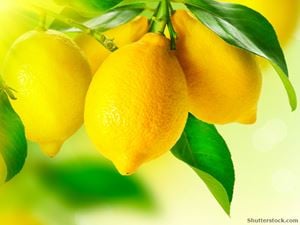
You have probably heard the saying, “when life gives you lemons, make lemonade”, which is to promote positivity in a difficult situation. This expression was shared by writer Elbert Hubbard during a 1915 obituary for dwarf actor Marshall P. Wilder, who was known to be optimistic and successful despite his disabilities.
Then in 1948, author Dale Carnegie shared a similar phrase in his book How to Stop Worrying and Start Living. Needless to say, it’s a phrase that has been around for quite some time sharing the sweetness of a bitter fruit.
Over the past few centuries, the uses for lemons has been astounding. In 500 AD, the ancient Egyptians developed lemonade. Then in the 1800’s, lemons were known as a cure for scurvy, a debilitating condition caused by a lack of vitamin C. Back then, sailors were at a high risk for disease, even more dangerous than being in enemy action! One reported expedition lost 1,300 of 2,000 men to illness. A man named James Lind experimented with a variety of remedies and found citrus fruit to be the most beneficial. This demand expanded the lemon growing industry, which began in California.
In the 1870’s, the first lemonade stands were set up in Brooklyn streetcars. This tradition still holds as a fun business practice for children today. Nowadays, we continue to find ways to use lemons in our daily routines.
Natural Beauty
There are many ways to use lemons to enhance your natural beauty. Lemons contain calcium, magnesium, potassium, vitamin C, and citric acid, making it an antibacterial and anti-fungal. Its antioxidant properties neutralize free radicals and boost collagen, adding a healthy glow when applied to your skin. You can apply to your skin and nails to reduce stains, spots and acne. It also removes any excess shine when used while washing your face. You can cut a lemon into quarters, dip into sugar and rub on your face for a natural and fresh exfoliator. You can apply lemon juice to your hair before spending time in the sunshine to add a natural highlight without the expense and time at a hair stylist. Before brushing your teeth, you can mix lemon with baking soda and apply to your teeth with a cotton swab for natural whitening. (It’s important to not leave lemon juice on the skin and teeth for long periods of time because of its highly acidic properties).
Body Health
You may know that lemons offer incredible benefits to your health. As you have learned so far, lemons are full of vitamins and minerals and help to combat illness. They actually contain more potassium than apples or grapes. Although they are acidic at first, when consumed they are actually alkalizing within the body, helping to balance the body’s pH balance. When our pH balance is more alkaline, we are able to fight off sickness and disease more easily. Starting your day with room temperature water and at least a tablespoon or two of lemon juice will help to cleanse the liver, increase bowel regularity, fight sickness, increase electrolytes, dissolve kidney stones, regulate blood pressure, boost metabolism, and strengthen vision, blood vessels and the immune system. They even help to clear congestion due to asthma, allergies and colds. They improve our health on so many different levels! According to The Reams Biological Ionization Theory, lemons are beneficial because they are the only food that is an ion with a negative charge, making it extremely useful in providing cell energy when interacted with ion with a positive charge.
In Your Food
Whether or not you have cooked with lemons before, they are often used to add flavor to a variety of recipes. Try mixing lemon juice with olive oil and herbs to create a summery salad dressing. You can put an entire chicken in the crockpot with a lemon baste for a nourishing whole meal. You can bake a delicious lemon meringue pie or lemon squares for an event. Of course you can make lemonade and add other fruit and vegetables for a refreshing beverage. From drinks to full meals to dessert, lemons can be added to just about any recipe that needs some zest! Chefs have been known to refer to lemons as one of their secret tricks. For example, tomato sauce sometimes needs a hint of acidity at the end of cooking, which a splash of lemon fulfills. In addition to using lemons in recipes, they can also be used to preserve other food due to the citric acid. Add a squeeze to sliced apples, potatoes and guacamole to keep from browning. Even having lemons on display in your kitchen will add a bright color and vibrant energy to the space.
Kitchen Cleaning
We know we can make lemonade, salad dressings and herb chicken but there are so many other uses for lemons in the kitchen! Because of a lemon’s amazing antibacterial and stain-removing abilities, they become a useful tool to clean and rid germs as well as remove mold and mildew. You can use them to clean your wooden cutting boards, remove stains from a wood countertop or grouted tile floor, polish brass and copper, freshen the garbage disposal, clean appliances, and remove water spots on utensils and dishes. Fresh lemon juice is actually known to kill salmonella and E. coli, enhancing the way to clean and sanitize your countertops, floor, sink and more. It is a non-toxic, chemical-free way to freshen the whole kitchen! Furthermore, you can create a spray bottle with lemon and water to repel ants and moths and for a simple and natural air-freshener.
Not only do lemons keep us optimistic and hopeful, in more ways than one, we realize the advantages within our daily routines. If you have too many bath, beauty, cleaning and disinfecting products, you may want to consider stocking up on lemons. It’s an inexpensive way to enhance your natural beauty, zest up your cooking, clean your kitchen, preserve food and remain healthy all-year long. This fruit is easily found throughout the seasons, making it readily available when needed.

